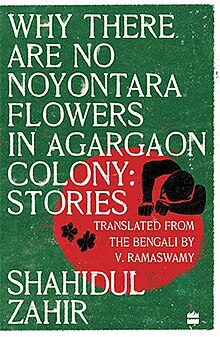
Huston Cummings Smith was a scholar of religious studies in the United States, He authored at least thirteen books on world's religions and philosophy, and his book about comparative religion, The World's Religions sold over three million copies as of 2017.

Mannathu Padmanabhan was an Indian social reformer and freedom fighter from the south-western state of Kerala. He is recognised as the founder of the Nair Service Society (NSS), which represents the Nair community that constitutes 15.5% of the population of the state. His birthday(January 2) is observed as Mannam Jayanti every year. Padmanabhan is considered as a visionary reformer who organised the Nair community under the NSS.
Manjula Padmanabhan is an Indian playwright, journalist, comic strip artist, and children's book author. Her works explore science, technology, gender, and international inequalities.

Satyajit Ray (1921–1992), a Bengali film director from India, is well known for his contributions to Bengali literature. He created two of the most famous characters in Feluda the sleuth and Professor Shanku the scientist. He wrote several short novels and stories in addition to those based on these two characters. His fiction was targeted mainly at younger readers, though it became popular among children and adults alike.

Thinakkal Padmanabhan, popularly known as T. Padmanabhan, is an Indian short story writer of Malayalam literature. He is a recipient of several awards including the Ezhuthachan Puraskaram, the highest literary award of the Government of Kerala. He declined some of the earlier awards he was selected for which include Kerala Sahitya Akademi Award (1973), Odakkuzhal Award (1995) and Sahitya Akademi Award (1996). Mahatma Gandhi University conferred on him the honoris causa degree of the Doctor of Letters in 2018. In 2023, he was honoured with the Kerala Jyothi Award, the highest civilian award given by the Kerala Government.

Thanu Padmanabhan was an Indian theoretical physicist and cosmologist whose research spanned a wide variety of topics in gravitation, structure formation in the universe and quantum gravity. He published nearly 300 papers and reviews in international journals and ten books in these areas. He made several contributions related to the analysis and modelling of dark energy in the universe and the interpretation of gravity as an emergent phenomenon. He was a Distinguished Professor at the Inter-University Centre for Astronomy and Astrophysics (IUCAA) at Pune, India.

Sanjeev Sanyal is an Indian economist and popular historian. A member of the Economic Advisory Council to the Prime Minister of India, he has helped prepare six editions of the Economic Survey of India starting in 2017. Sanyal has written several books on Indian history to mixed reviews.
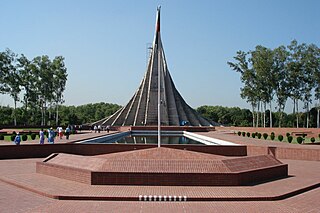
There have been numerous works of art created as a result of the Bangladesh Liberation War. In 1971, a concert was organized by members of the British rock band, The Beatles, in support of Bangladesh. The songs recorded for and broadcast on Swadhin Bangla Betar Kendra are still considered to be the best of Bangladeshi protest songs.
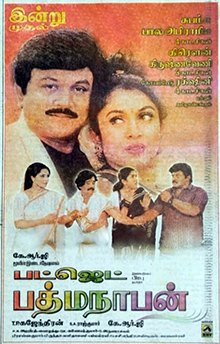
Budget Padmanabhan is a 2000 Indian Tamil-language comedy film. The film stars Prabhu and Ramya Krishnan.

Shahidul Zahir was a Bangladeshi novelist, short story writer and government bureaucrat. He is known for his unique practice of magical realism in modern Bengali literature. His novels and short stories are highly acclaimed for their originality of language and narrative technique. He contributed to Bengali fiction a distinct style, known as the "Shahidul Zahiriya".

Anbe Aaruyire (transl. Darling) is a 1975 Indian Tamil-language romantic comedy film, directed by A. C. Tirulokchandar. The film stars Sivaji Ganesan and Manjula. It was released on 26 September 1975. The film is a remake of the 1967 Telugu film Gruhalakshmi.

Mayyazhippuzhayude Theerangalil is a Malayalam-language novel by M. Mukundan. The novel vividly and mystically describes the historic political and social background of the former French colony of Mahe (Mayyazhi). The novel was translated into Tamil, English and French.
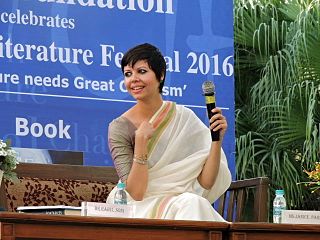
Janice Pariat is an Indian poet and writer. She was born in Assam and grew up in Shillong, Meghalaya.
Shweta Taneja is an Indian author of novels, short fiction, graphic novels, nonfiction and comic books. Her work includes fantasy fiction series The Rakta Queen: An Anantya Tantrist Mystery, The Matsya Curse: An Anantya Tantrist Mystery, Cult of Chaos: An Anantya Tantrist Mystery and books for YA and children including The Ghost Hunters of Kurseong and How to Steal a Ghost @ Manipal.
Anita Agnihotri is an Indian Bengali writer and poet. She has been translated into major Indian and foreign languages, including but not limited to English, Swedish and German. She is also a retired civil servant. She lives in India.
Arka Sinha/Orko Sinha is an Indian film maker, actor, writer, lyricist, singer, composer, producer and a former computer science engineer from the movie industry of West Bengal, Kolkata. He marked his debut with Aamar Aami in December 2013. The script-screenplay-lyrics-dialogues and direction of the film were all by Orko.

S. Hareesh is an Indian writer, translator and screenwriter of Malayalam literature and cinema. He is best known for his short stories and his acclaimed but controversial debut novel, Meesa, which explores caste in Kerala in the mid-20th century. The novel, initially serialized in the Mathrubhumi weekly, was withdrawn after protests by right-wing Hindutva groups and caste-community organizations for "maligning Hindu women and temple priests". It was later published as a full novel by DC Books. Hareesh is the recipient of several honours including the Kerala Sahitya Akademi Award for Novel and the Geetha Hiranyan Endowment of the Kerala Sahitya Akademi. In November 2020, the English translation of Meesa, titled Moustache, was selected for the JCB Prize for Literature, the Indian literary award with the highest prize money.
Ekti Raat is a 1956 Indian Bengali-language comedy film directed by Chitta Basu and produced by Harendranath Chattopadhyay based on, Bhimpalashree, a story of Bengali novelist Balai Chand Mukhopadhyay. Film starring Uttam Kumar and Suchitra Sen in lead role with Tulsi Chakraborty and Bhanu Banerjee. This film was released on 26 April 1956 in the banner of H.N.C. Productions. In the 1990s, a television series Manush, based on the same plot, aired. This film become successful at the box office.

Abu Ibrahimer Mirtu is a Bengali novel written by Shahidul Zahir. This is Zahir's fourth novel posthumously published by Mowla Brothers in 2009. Written against the backdrop of the reign of the then-dictator Hussein Muhammad Ershad, it is a novella, the story of which is rich in connotations and commentary on the human experience. The dedication of the novel reads: "People does die, of course, but the meaning of death is different..." Also includes "A person is inherently dead, or heavier than Taishan, or lighter than a feather" quote by Chinese historian Sima Qian.
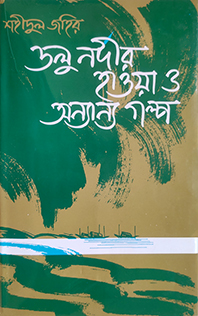
Dolu Nadir Hawa O Annanya Galpo is a Bengali short story collection written by Shahidul Zahir. This is Zahir's third collection of short stories published by Mowla Brothers on 1 January 2004 in Bangladesh. It compiled seven stories, written between 1999 and 2003. In the background of the stories, there are various contexts and curiosities related to the people from Bhuter Goli at Puran Dhaka and villagers, and the love, dreams and dream-breaking of the people.
